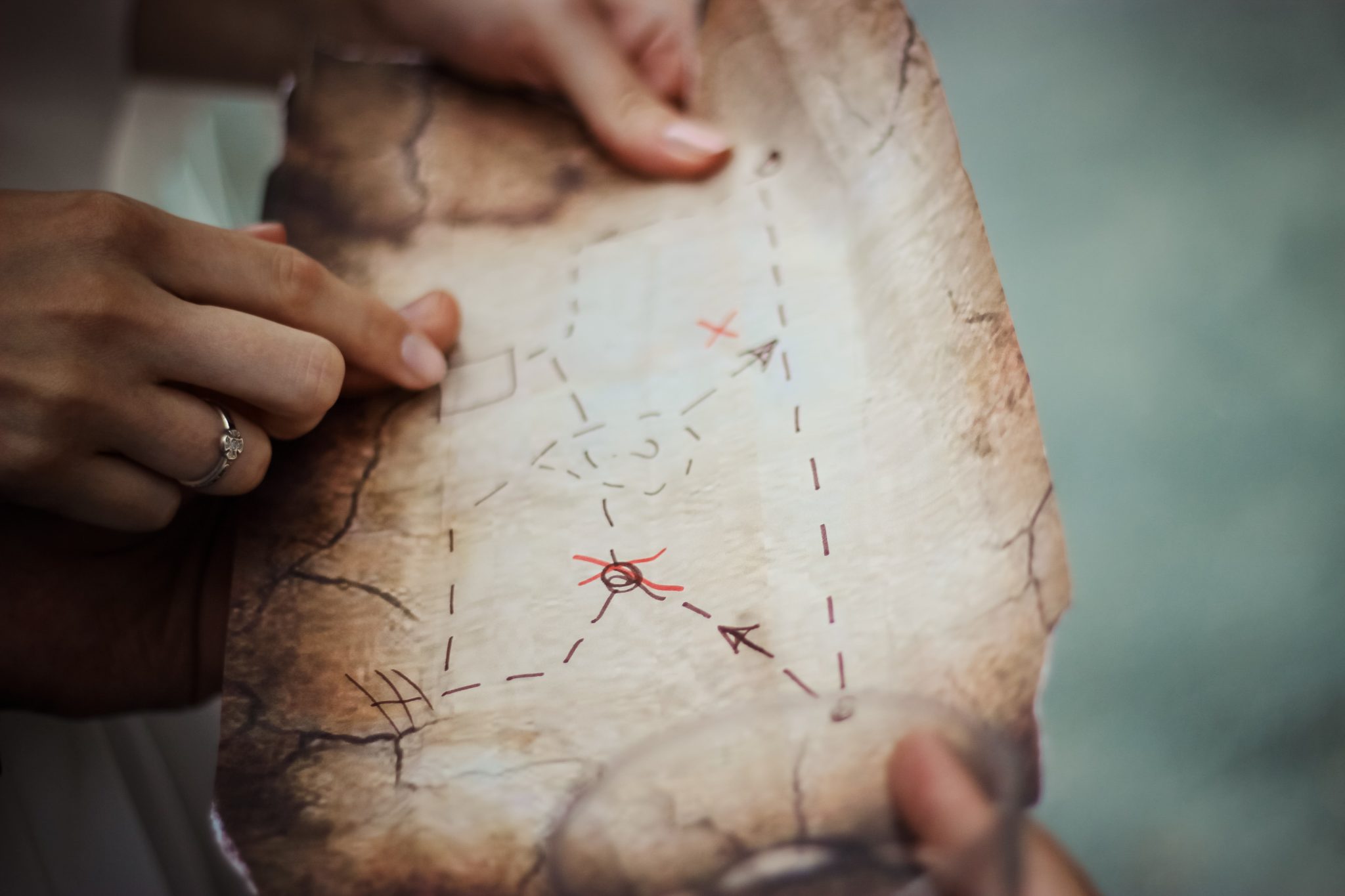I ’d like to invite you into a cartography exercise, but rather than mapping a geographic region, we are going to create a map of your heart. For a few years, I’ve been fascinated by what Jesus said in Matthew 6:21: For where your treasure is, there your heart will be also. Many of us have a desire to live a wholehearted life, so creating this treasure map of our hearts seems like a worthwhile exercise. All cartographers use a combination of way points and data to create their maps, so we’ll need some data to help us make an accurate map.
Mapping out where your treasure is
May I suggest an unlikely source of data? Where is your treasure buried? Let’s work through your monthly expenses, and from there we’ll create a map of your heart.
I’ll go first. That really big expense at the beginning of the month… that’s my mortgage, property taxes, and homeowner’s insurance.
Okay, so a primary housing expense is something most of us will see in our expenses. What could this possibly tell us other than this is a big expense that we can’t really avoid? This expense actually maps out a significant portion of my heart. It shows my desire for security and comfort. It starts to sketch the contours of the community I care about, and the public school system I want to invest in. It shows what my wife and I want for our kids. It paints a picture of how much I think I need to live comfortably—for better or for worse.
We could go on. A few nicer restaurant expenditures might show that I’m investing in my marriage on date nights. (And, if we’re going to be honest, a lack of those expenses might show that I’m letting other priorities get in the way.) Our expenses can show the health of our hearts, or the lack thereof.
Here’s a perfect example. A recent run through my expenses showed something I’m not too proud of. There were a slew of little purchases from McDonald’s throughout the month.
When I stopped to wonder about this, I knew exactly what was going on. We were in a very busy season of life, spread too thin, and rather than prioritizing family meals, we were picking up a few cheap burgers here and there to make sure everyone was fed as we ran from one place to the next. These little purchases showed a heart that was spread and worn thin (as well as arteries clogging, but that’s another article.)
I should mention that as you map your own heart, you’ll also find a lot of things that aren’t good or bad, they are just there. I’d like to think we’re all super philanthropists who are trying to save the rainforest, but we know all of that money going to Amazon isn’t always for the betterment of ourselves or the world. These less-thoughtful purchases are simply the potential for increased wholehearted living. If we could be intentional about those dollars, how could our hearts grow?
What’s missing?
All of those expenses paint a picture, but any cartographer will need to fill in details where the data might be missing or incomplete. Just as important as what you spend your money on is what you’re not spending your money on or giving your money to.
I might say that I care about being healthy, but am I spending my money on healthy food, or am I buying decent running shoes? Again, please ignore all of the McDonald’s purchases.
I am lucky enough to have a really good church community. It inspires me, gives me opportunities to serve, and gives me the chance to grow alongside my kids. Maybe even more importantly, my church does this for a lot of other people, and it has the potential to care for so many more families in my community. Does my giving reflect the impact that my church has, and the impact that I want it to have?
Here’s an exercise to try. Let’s say that you or I go to church one to two times a month (the average for church-goers). Maybe we text in a $20 gift when we talk about giving in worship. Over the course of the year, that amounts to $360. Our salary is $50,000 a year. We’ve given 0.7 percent of our income to a pretty significant portion of our lives. Meanwhile, we spend $200 a month eating out. That comes out to $2,400 a year, and 4.8 percent of our income.
Now hear me out. This is not a shame exercise to say that you should never eat out and give all that money to your church! What this allows you to do is to map out all of your expenses, and then ask two questions: Does this feel balanced in a way that makes me happy? Does this reflect my heart (what I value and what I care about)? It may feel good to you, or it may lead you to rebalance.
Here’s why I believe this exercise is so important. One of my favorite all-time quotes is by author Richard Foster, who writes:
We really must understand that the lust for affluence in contemporary society is psychotic. It is psychotic because it has completely lost touch with reality. We crave things we neither need nor enjoy. “We buy things we do not want to impress people we do not like.” … It is time to awaken to the fact that conformity to a sick society is to be sick.
When we aren’t thoughtful about where we invest our treasure, we tend to naturally put it in places that aren’t very “heart-healthy.” Investing our money in a way that reflects our values takes thoughtfulness and intention. Oh, and that line, “We buy things we do not want to impress people we do not like”? Once you see it in your own life, it’s impossible to unsee. Sorry about that!
Defining “treasure”
In the final installment of the Harry Potter series, Harry and Hermoine are trying to unravel a mystery, and they find themselves in a graveyard that has ties to both Harry’s family, as well as Albus Dumbledore’s family. On the tombstone of Ariana Dumbledore is inscribed those familiar words from Jesus, Where your treasure is, there your heart be also. As Harry reads this, he is going through both the anxiety of this intense task before him, while also dealing with feelings of longing to connect with his family, his mentor, and his past that were taken from him too soon. All of which are presently powerful in this graveyard. He knows that Albus Dumbledore, his mentor, must have chosen this inscription, but he doesn’t know why or what it means.
All of Dumbledore’s words were layered with meaning, but perhaps Albus was calling all who read that inscription to remember that his treasure was not his successes, possessions, or stresses of the day. His treasure was not the tombstone that was decaying over time, but he found treasure in the painstaking duty of caring for his special-needs sister, whose grave bore the inscription. Looking back on the investment of putting his heart into that real and messy relationship, he discovered a more full and wholehearted life.
In the same passage in Matthew, Jesus says, “‘Do not store up for yourselves treasures on earth, where moth and rust consume and where thieves break in and steal; but store up for yourselves treasures in heaven, where neither moth nor rust consumes and where thieves do not break in and steal’” (Matthew 6:19-20). This is not some hyper spiritual saying that means ignore your life on earth and wait for some heaven in the sky. In this passage, the translated word “earth” is likened to things that decay, and the word “heaven” is likened to the values and worthwhile things of life that are timeless—the things that God cares about.
I’ve talked about tracking expenses to map our hearts, but I don’t believe that money itself is the treasure that Jesus is talking about. The treasure is where we are putting our time, energy, and resources, and the use of that treasure unveils the truth of our hearts. Is your treasure found in things that decay, or in values that are timeless? Treasure is more than money, but money is the thing we are commonly the most protective of, the most secretive about, and the thing that often has the most control over us. That’s why in our heart mapping exercise, we’re focusing on it.
Because we cling to our money so tightly, perhaps the way we use it is the best indication of the condition of our hearts.
Finding balance in where we put our treasure
I’m more convinced than ever that God doesn’t desire us to move toward radical extremes in the guise of faith. Extremes are found on the edges, and on the edges, we find chaos. I believe that a Spirit-filled life is a life of discovering holy balance, centeredness, and wholeness. It is there that God’s still small voice speaks most clearly and profoundly.
We remember the parable of the servants who were rewarded for investing their master’s treasure. And we also remember the rich young ruler who could not follow the way of Jesus because he couldn’t let go of his treasure. We must find our balance somewhere in the middle, saving and stewarding our treasure so that we can live out our values, while not holding onto it too tightly that it prevents us from living a truly full life.
The beauty of making a treasure map from your monthly expenses is that it is a clear way to see whether or not your values are actually being lived out. Where your treasure is, there your heart will be also. Where’s yours?

Billy Norden
Billy Norden serves as retirement and financial education coordinator for the Reformed Church in America’s Board of Benefits Services. You can connect with Billy at bnorden@rca.org.



